 FILM
FILM « In Which We Are A Commodity To All Who Love Us »
 Friday, January 8, 2010 at 10:25AM
Friday, January 8, 2010 at 10:25AM 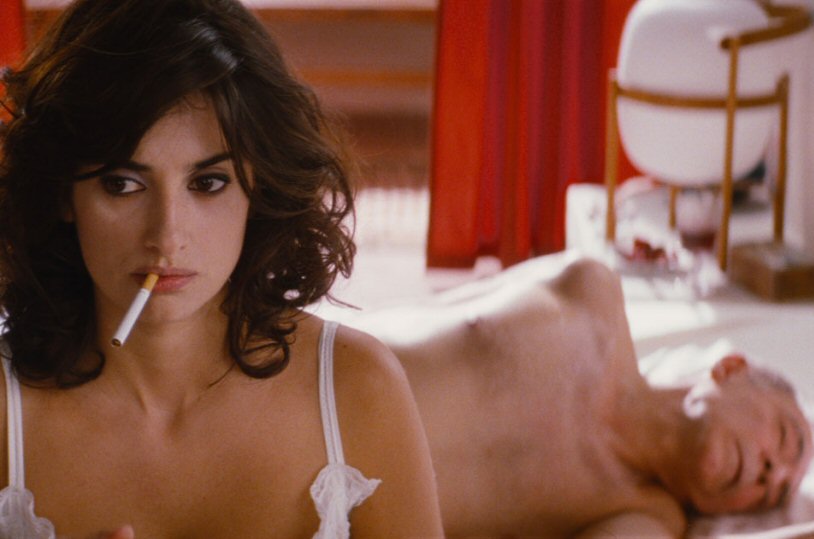
Cherry Picking
by KARINA WOLF
Both Nine and Broken Embraces propose that finishing a film is a life or death deal. Certainly, to the protagonists — addled directors with chaotic emotional lives — film is all-encompassing escape. As Woody Allen says about the profession: “You get the reward of distraction — you don’t think about the outside world, and you’re faced with solvable problems, and if they’re not solvable, you don’t die because of it. I get to live with very beautiful women and very witty men and they have costumes, and the sets are beautiful. It’s a very pleasant way to waste your life.” Who wouldn’t perceive threat to this lifestyle as a kind of imminent demise?
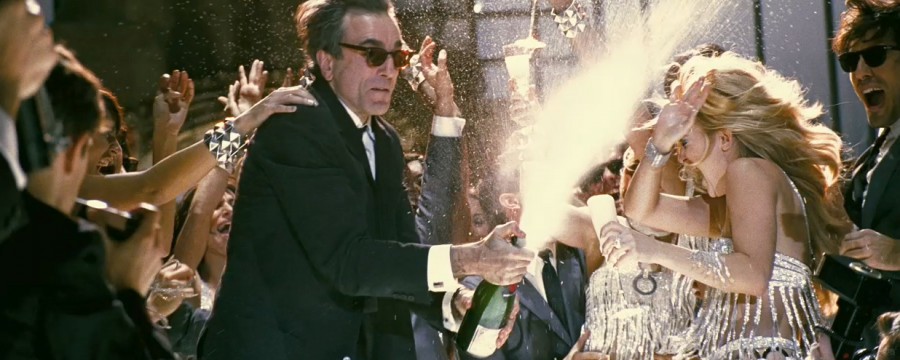
I’m surprised no one pitched this Hollywood folly in The Player: morph Fellini’s 8½ into Nine (is the relativity of a fraction is too tough on an audience?), a Broadway show turned into a filmic musical about a director who can’t find an story. While Fellini’s Contini seems quite aware of his absurdity, his shadow self in Rob Marshall's Nine holds his head as if he’s pondering Yorick’s skull.

Leave it to Judi Dench to recognize that filmmaking is not brain surgery; it’s about decisions. “You say yes and no,” she summarizes Contini’s job spec. Though they’d like to think otherwise, the people sustained by this enterprise are cast and crew.

Like Fellini, Almodovar lets us suppose his protagonists might be his stand-ins: directors, writers, dancers, drag queens — storytellers — populate his films. At the start of 2004's Bad Education, we are allowed insight into what might be the filmmaker’s method of conceiving a story. An auteur scavenges a tabloid for clippings that he might fashion into a film. The source material makes sense — art, after all, is cherry-picked from experience. And Almodovar’s strength lies in his joy at life’s outlandish variety, in his empathy for the preposterous and the perverse. A nurse rapes an unconscious patient, any number of men kidnap and tie up their girlfriends, jilted women poison their boyfriends’ gazpacho, all in a way that’s logical and ineluctable. While another director might want to prod an audience, Almodovar makes them love the characters they want to judge. Characteristically, Broken Embraces’ personae embody a spectrum of human weakness.

Everything has already happened, says Harry Caine, the film’s pseudonymous hero. The only thing left is to enjoy life. Thus the blind man excuses his tryst with a blonde who helps him cross the street and shags him on his living room sofa. The camera is a double for Caine’s desire. The blonde’s breasts and a tray of tomatoes and Penelope Cruz’s face are all shot delectably. In an interview at the DGA, Almodovar admitted that a scene in Law of Desire, in which Carmen Maura allows a street cleaner to hose her down in the early morning heat, was his own fantasy. For him, for all of us, cinema is wish fulfillment, the ultimate opportunity to enact missed opportunities and to forge resolutions.

Almodovar’s stories explore obsession — what it prompts, how it’s remembered, occasionally its causes (because those are so tricky to pinpoint), always its consequences. Once called Mateo Blanco, Harry was a director of some renown, popular enough to attract a devoted staff, a fanatical fan base, a volatile mistress and an inspiring muse (Penelope Cruz). Like Contini, Broken Embraces’ director character is endlessly indulged. The film proceeds by jumping between past and present, tracing the events that led to Harry’s loss of sight and identity.
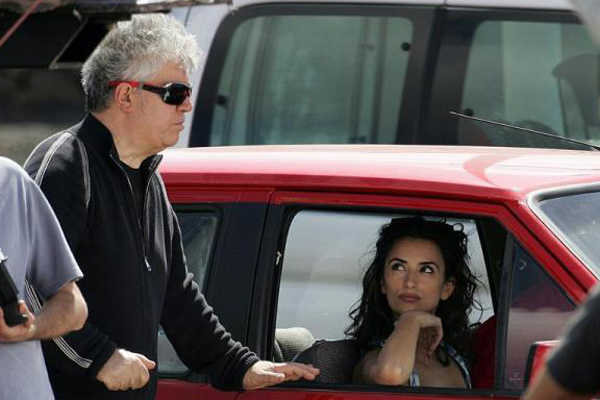
Broken Embraces is marketed as Almodovar’s tribute to filmmaking, though this tagline might be applied to any number of his films (along with those of Tarantino, and any other cineaste who works out of love of the medium). In All About My Mother, he references All About Eve and Cat on a Hot Tin Roof. In Broken Embraces, we detect Belle de Jour, Sunset Boulevard, Elevator to the Gallows, Arthur Miller, and the vampire subgenre. Broken Embraces also winks at Almodovar’s own oeuvre, specifically his breakthrough work, Women on the Verge of a Nervous Breakdown (the stand-in film is called Girls and Suitcases). We might accuse the director of enacting a kind of Paul Auster postmodernism. Almodovar leans more on melodrama than noir, but he relies too much on the uncanny and doubled characters, as if the existence of multiple selves could be a revelation.
*
I remember reading somewhere that French President Mitterand thought a woman was at her best in her thirties. It is probably cultural imperative for a French President to comment on beauty in women. (What’s more, Mitterand was hoping to make Juliette Binoche his mistress with the remark.) It turns out he's right. At 35, Penelope Cruz has achieved her pinnacle, where form functions beautifully in service of emotion.
The film withers without her — there are several nested tales within Broken Embraces, but none of them breathe in Cruz’s absence. Each time the story revisits her Lena, it is renewed: she is a desperate woman trying to be respectable, a frivolous mistress, an empowered actress, a passionate artist who will sacrifice anything for her work and for the lover who directs her. You’ll never see her as good as she is in this movie; that’s counting Vicky Cristina Barcelona for which she won an Oscar and All About My Mother and Live Flesh, in which her brief scenes linger longer than her screen time.

In a wonderful moment, Almodovar reinvents the Hollywood montage by posing Cruz as the goddesses, great and minor, of cinema. Here, Almodovar treats us to a wonder we don’t witness in ordinary films, in which the direction is cut from the recorded performance. Mateo/Harry instructs Lena, and we get to see the energy and persuasion with which Cruz imbues each shot. She enacts innumerable quick changes: she is endearingly comic (one character says she’s too pretty to be funny, an utterly incorrect appraisal) and tragic and startled. She blooms. An amusing hairdresser produces a white-blonde wig that’s light and effervescent and glaringly fake. It’s fanciful but Cruz isn’t allowed to be happy: “No smiles,” Mateo tells her. “The wig is false enough.”
Mateo’s comment makes it clear: Lena is a commodity to all the men who love her. Mateo would rather construct a beautiful image than see her smile. It strikes me that despite his prompts, Cruz’s Lena is not meant to stand in as the Spanish Audrey Hepburn or fizzy Goldie Hawn. Those are two empowered stars. Broken Embraces is a Marilyn story. Cruz, celebrated and elevated by Almodovar’s sumptuous conception, is for once not the victor or even the heroine in this fable. Her tragic end is an uneasy fit for Almodovar who is usually so generous with his characters. The women are comic and strong; the men are oversexed but romantic: they cry at the ballet and over old films, they are nostalgic narcissists. Sex is a sport and a pastime and also the ultimate iteration of love. Here a man allows his lover to be abused and prostituted so that he can continue his own work.
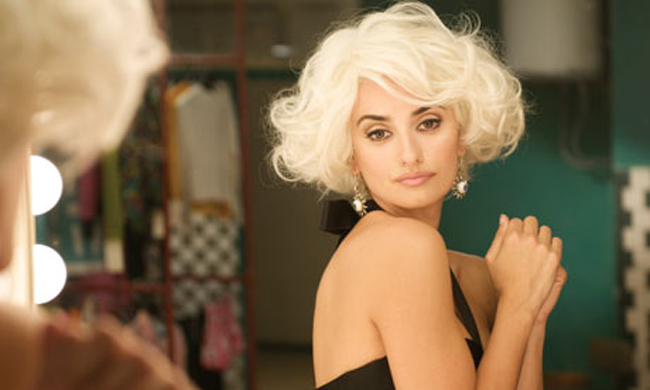
Broken Embraces is the film I watched the most in the last year. First, because it was the new film by Almodovar. Second, because I wanted to know why it made me sad. Third, because on consideration, I expect sadness from Almodovar but I also expect justice or at least a kind of balance. This time he sacrificed humanism for the sake of making art. "Films should be finished even if they are finished blindly,” Mateo/Harry says. The director is revived at the expense of his muse. In Nine, Marion Cotillard plays wife to the errant, unreliable Guido. She understands the impulse behind a remark like Harry’s. "You forgive yourself in the public eye," she says of Guido’s false promises. Despite its voluptuary's pleasures, Broken Embraces is guilty of the same misdeed.
Karina Wolf is the senior contributor to This Recording. She is a writer living in New York. She tumbls here.

"Girl I Love You" - Massive Attack (mp3)
"Babel" - Massive Attack (mp3)
"Splitting the Atom" - Massive Attack (mp3)
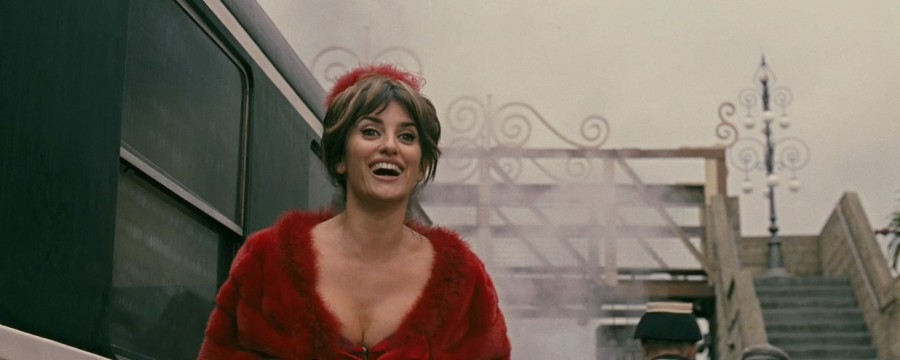
 1 Comment |
1 Comment |  1 Reference |
1 Reference |  almodovar,
almodovar,  karina wolf,
karina wolf,  penelope cruz,
penelope cruz,  rob marshall
rob marshall 





























Reader Comments (1)
Thank you for sharing such good experience.replica hermes|